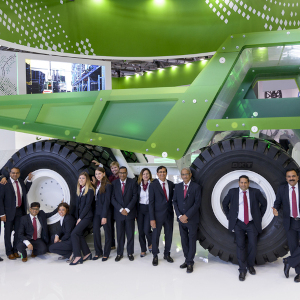The construction industry is well known for being a gruelling industry to work in. This article explores some of the root challenges that construction workers and companies face daily, along with some solutions.
Far from being depicted as a glamorous industry, the construction industry is well known for being a grueling industry to work in - where a hands on approach is necessary to get the job done. Even as the industry undergoes an exciting transformation with the advancement of technology, workers within the industry are still subjected to a host of challenges on a daily basis, necessitating a versatile and adaptable approach to work.
Within this article we explore some of the core challenges that construction workers and companies face on a daily basis, as well as some solutions which may ease the burden of such challenges.
1. An Aging Workforce
The issue surrounding an aging workforce in construction is by no means a new challenge that the industry is facing, but rather is an ongoing struggle that governments and construction companies alike are working to resolve. There are a number of contributing factors, including a general decrease in the working population across Europe, skilled worker shortages and an evolution of skills required.
Another core issue is the perception of construction workers as unskilled laborers - which is struggling to attract younger talent. However, in truth, the required skills for construction are moving increasingly towards energy efficiency and digitalisation to facilitate the growth and progression of the industry. As such, demand for youngsters with bachelor degree-level (or higher) qualifications is expected to account for one third of all jobs in construction by 2025.
2. Worker Skill & Productivity
As explored above, the demand for more skilled workers is rapidly increasing across the construction sector. However, because of the shortage of skilled workers, large amounts of the existing workforce are unskilled, and as a result, work productivity is declining. This issue will continue to escalate in coming years as the older generations of skilled and experienced workers begin to retire, and only younger, improperly skilled workers remain.
Such issues can only be mitigated through the proper delegation of time and financial resources to properly train young workers, as well as upskilling existing employees.
3. Unpredictable Working Environments
Unpredictable weather can cause issues for a number of industries - and in Europe, we’re certainly subjected to a great deal of uncertainty when it comes to the weather! But for the construction industry, adverse weather conditions can wreak havoc with project timelines.
Whilst workers are generally well adapted and resilient to the elements, some conditions cannot be worked around. For example, with continuous rainfall, workers are often forced to pause work on site and wait for drier weather. Further to this, once work is able to commence again, workers must undertake additional tasks such as pumping out water and removing debris before they can resume their previous work.
In addition to this, fluctuation in weather conditions can make it harder for project managers to properly plan and order in the appropriate equipment needed to carry out works - for example, vehicles better suited to working with wet or slippery terrain vs dry land.
4. Fluctuating Compliance Regulations
Technologies, equipment and capabilities are constantly evolving across multiple industries, and with it, the various regulations that govern their usage. The construction industry is no exception and companies are regularly subjected to updates in compliance requirements at a local, national and international level from a host of different regulatory bodies.
With sustainability now taking a leading role in the progression of the construction industry, companies can also expect to see an increase in regulations around greener construction practices.
New regulations, or an oversight in compliance, can cause a variety of issues for construction companies from delays, to loss of contracts and penalties.
5. Equipment Maintenance and Replacement
Many organizations overlook the costs associated with proper maintenance and replacement of equipment used in construction. Such oversights can lead to overspending on projects, and can also cause on-site delays if crucial equipment is non-functional. Replacing equipment within the duration of a project costs time and money, which can eat into profit margins and potentially damage client relationships.
Regular checks and the proper monitoring of equipment can assist in spotting problems that need to be solved earlier and reduce the chances of errors and breakdowns occurring during the project period. Regular and routine checks may seem tedious for some, but they can save a lot more time and money in the long run. In addition to this, a higher spend on quality products from the outset can reduce the rate of equipment failure and replacement.
6. Workflow Dependency & Suppliers
Construction projects are typically planned with stringent deadlines to meet client demands, with intertwined and dependent workflows. There is rarely room for error and any delays can have a knock-on effect across the whole project. Nonetheless, supplier delays are common - often caused by macro factors outside of supplier control, such as shipping - and as a result, construction workers must adapt schedules and workflows regularly to ensure that project deadlines are not too significantly impacted. Further to this, project managers are often unable to add in significant ‘buffer’ time into their project timelines, as bidding for construction projects can be competitive and success will often lie with the company that can offer clients the shortest turnaround time.
7. Cashflow
Owing to the intertwined nature of construction projects (as described above), cashflow is also a common issue that impacts construction workers, often cited as the main cause of insolvency for contractors and subcontractors. This is often the result of construction firms agreeing to longer payment terms with clients in order to secure contracts over competitors, with the average cash collection period for construction projects recorded as 83 days in 2019-20.
This issue was further exacerbated during Covid, in which there were little-to-no contractual provisions between contractors, suppliers and end-users regarding such events. Additionally, projects which had been reliant on international suppliers were subjected to severe and unpredictable delays. The overall result of this was that further towards the bottom of the chain, many contractors were looking at a significant delay in payment, whilst continuing to plow human and material resources into the completion of projects.
Mitigating Some of These Common Problems
There is no one-stop solution to all of the issues faced by construction workers, and as with every career, overcoming certain challenges are part and parcel of the job. Nonetheless, there are certainly steps that can be taken to mitigate some issues.
Training & Upskilling
Whilst government sanctioned training may be lacking behind the demand for skilled construction workers, companies can look to develop and implement their own training to increase capabilities and productivity. In addition to improving workforce productivity, this can also help to foster a greater team morale - which in turn will increase employee retention rate.
At BKT we have seen great success with our own such training initiatives, including our Campus to Corporate Program, which attracts young talent every year to introduce innovative, fresh minds to the BKT organization, and infuse new thinking into tackling challenges that the industry faces.
Quality Equipment
Unpredictable work environments and faulty or broken equipment are both factors that can cause project delays and reduce project profitability.
Whilst we will never be able to control the elements(!) We can certaining equip construction teams with the proper industrial tires or OTR tires needed to tackle projects. offering versatility across a range of environmental situations.
Further to this, as an organization that strives for quality and sustainability, a great deal of work has gone into ensuring that our products offer customers value through longer product life cycles and quality assurance. Did you know that BKT performs 500 tests and quality checks throughout our tire and product production cycle?
Find out more about our industrial and OTR tire products by clicking on the links.






